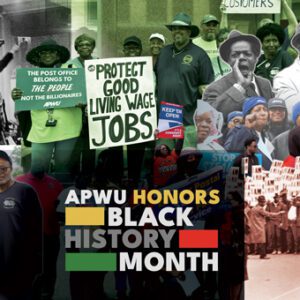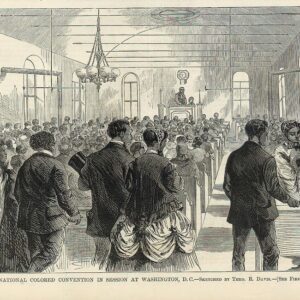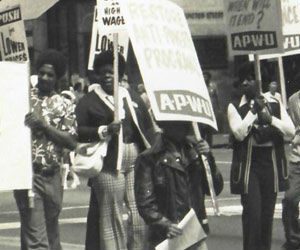June 30, 2012
Joe Glazer: Singer, Songwriter, Union Activist
Music has played an important role in the labor movement’s efforts to uplift, organize, and build solidarity among workers for more than a century. And for the past seven decades, singer-songwriter Joe Glazer dedicated his many talents to the fight for social and economic justice at union rallies and on picket lines across the nation.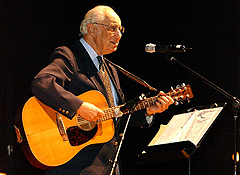
“Armed only with his guitar, reams of songs, and conviction, Glazer has marshaled the power of music to fight for union representation in mills, mines, factories, and offices all over the country,” notes a 2002 University of Illinois Press review of Glazer’s autobiography, Labor’s Troubadour. “A performer, educator, and ‘musical agitator for all good causes,’” he used “humor, irony, and pathos to drive home the message of unionism.”
Early Life
Born the son of a union garment worker in New York City in 1918, Glazer grew up in the Bronx, where as a child he enjoyed listening to Gene Autry and other cowboy crooners on the radio. He bought a $5 guitar from a Sears catalogue, and learned how to play, beginning a life-long avocation.
In 1942, Glazer married Mildred Krauss, who he met several years earlier at summer camp in upstate New York, where both worked as counselors — and where he led his first strike.
“They had us plucking chickens,” he told WETA TV many years later. “I said, ‘Hey, that’s not part of the job. What kind of deal is this?’ and led a walkout.”
Songs Formed ‘On the Line’
Glazer graduated from Brooklyn College and served as a civilian radio instructor for the Army Air Corps after failing a military induction physical exam. For most of World War II, he was stationed in Madison, WI, where he studied math and physics. But he became more interested in Mildred’s field, labor studies, and switched majors, earning an advanced degree in labor economics. After graduating, Glazer became an assistant education director for the Textile Workers Union.
Taking up his boss’s suggestion that he lend his musical talents to union work, Glazer traveled in New England and across the south to perform at striking millworkers’ union meetings and at picket lines.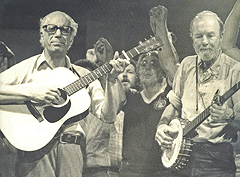
While on the road, Glazer drew inspiration from the workers he met. He absorbed and adapted their songs, which were mostly rooted in gospel, Appalachian and other folk traditions, for the union cause. One Christian hymn became “We Shall Not Be Moved,” which has been sung at countless union and Civil Rights protests for over 60-years:
“We’re fighting for a contract. We shall not be moved… We’re fighting for our future. We shall not be moved… We’re fighting for our freedom. We shall not be moved…”
“I led nearly a thousand strikers in verse after verse,” Glazer wrote about a labor demonstration in the 1940s. “I would sing out each new verse, and the strikers closest to me would pick it up. The new verse would roll like a wave through hundreds of others further down the line.”
In 1950, Mr. Glazer was the first to record a union version of “I Shall Overcome,” a hymn written by Rev. Charles Tindley, a Philadelphia minister, which became a standard on picket lines. The song was later adapted by Pete Seeger as “We Shall Overcome” and became the anthem of the civil rights movement a few years later.
By then, Glazer had moved to Akron, OH, where he served in a similar role for the United Rubber Workers union.
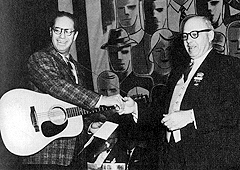
In 1961, Glazer took a job in John F. Kennedy’s administration, as a labor information officer in Mexico for the U.S. Information Agency, then joined the Johnson Administration as a State Department a labor adviser in 1965 — positions he often referred to as his “day jobs.” Off the clock, he continued to play and rally workers at union events at home and abroad.
By the time he arrived in Washington, Glazer was already well known by Congress of Industrial Organizations leaders as a well-educated and musically gifted activist for social justice, and was invited to perform at the merger of the CIO and American Federation of Labor in 1955.
Legacy
For the next 50 years Glazer lived in the Washington, DC area, where he continued his career rallying the troops at union events and spreading the message at folk music concerts. He died in September 2006, at 88.
 During his career, Glazer also shared platforms with First Lady Eleanor Roosevelt; presidents Kennedy, Johnson, Carter and Clinton; as well as Walter Reuther, George Meany, Cesar Chavez and many other labor and civil rights leaders.
During his career, Glazer also shared platforms with First Lady Eleanor Roosevelt; presidents Kennedy, Johnson, Carter and Clinton; as well as Walter Reuther, George Meany, Cesar Chavez and many other labor and civil rights leaders.
Despite rubbing shoulders with the powerful, Glazer “never wavered from supporting workers’ efforts to secure fair wages and decent working conditions,” University of Illinois Press wrote. “His reward has been to see his music bring unity out of discord, galvanize union support, and lift the spirits of striking workers who were running low on every resource except a shared faith in the strength of unity.”
The Washington Post wrote, “His songs were meant to rouse, and they did. With his booming baritone voice, a thumping guitar, a broad infectious smile and a natural exuberance, Mr. Glazer intended to light up the hall, and he did. He was in constant demand well into his 80s and found it hard to turn down an invitation, whether for a crowd of thousands or a gathering of friends.”

Over his career, Glazer wrote and recorded several well known pro-union songs, including a 1947 hit, The Mills Were Made of Marble, (“There was no unemployment in heaven, We worked steady all through the year, We always had food for the children, We never were haunted by fear”), and, in 1967, Too Old to Work (“They put horses to pasture, They feed them on hay, Even machines get retired some day; The bosses get pensions when their days are thru, Fat pensions for them, brother, nothing for you.”)
Glazer recorded more than 30 albums and published book about labor music, the New York Times reported in 2006, which helped inspire “a new generation of protest singers.” He was also a gifted vocalist who often shared the stage with many other notable performers, including jazz guitarist Charlie Byrd, folk music legend Pete Seeger, and many others.
In 1979, Glazer helped form the Great Labor Arts Exchange, which sponsors an annual gathering at the National Labor College in Silver Spring, MD. In 1983, he and fellow GLAE co-founders Joe Uehlein and Saul Schniderman founded the Labor Heritage Foundation for activists and organizers to share the union message through music, visual arts, and performance works.
Many of the songs Glazer performed are preserved by the Smithsonian and can he heard online at www.folkways.si.edu. Some of Glazer’s performances can also be seen on YouTube.

